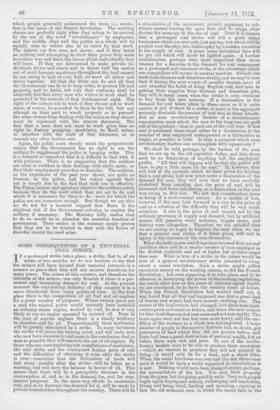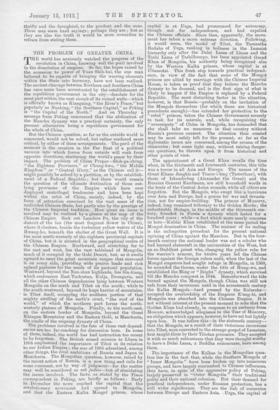SOME CONSEQUENCES OF A UNIVERSAL COAL STRIKE.
IF a prolonged strike takes place, a strike, that is, of six weeks or two months, we do not hesitate to say that the miners will have injured their material interests in a manner so grave that they will not recover therefrom for many years. The mines of this country, and therefore the interests of the miners, can only flourish if there is a per- sistent and increasing demand for coal. At the present moment the coal-mining industry of this country is in a sense threatened from many points of view. In the first place there is the competition of oil fuel and oil engines for a great number of purposes. Where twenty years ago a man who wanted power would certainly have installed an ordinary steam engine, worked by coal, he now is very likely to use an engine operated by mineral oil. Even in the case of marine engines there is a steady tendency to abandon coal for oil. Unquestionably these tendencies will be greatly stimulated by a strike. In many instances the strike will prove the turning point, and will make men who now have recourse to coal come to the conclusion that as Boon as possible they will resort to the use of oil engines. By those who are contemplating new installations of machinery, the coal strike and the consequent famine price of coal and the difficulties of obtaining it even after the strike is over—remember that the dislocation of trade will last many months after the strike—will be taken as a warning, and will turn the balance in favour of oil. This means that there will be a perceptible decrease in the consumption of, and so in the demand for, coal for com- mercial purposes. In the same way efforts to economize coal, and so to decrease the demand for it, will be made by private householders throughout the country. There will be a stimulation of the movement, already apparent, to sub- stitute central heating for open fires and to adopt other devices for economy in the use of coal. Next it is certain that a prolonged coal strike will kill a good many businesses which are now only just paying, but which will bo pushed over the edge into bankruptcy by a sudden cessation in the supply of coal. A great many industrial fires will be put out which will never be lighted again. A further consideration, perhaps even more important than these reasons for a decrease in the demand for coal consequent on a prolonged and universal strike, is the advantage which our competitors will secure in neutral markets. Already our trade feels German and American rivalry, and we maybe sure that if during the next couple of months foreign users of coal abandon the habit of using English coal, and take to getting their supplies from German and American pits, they will in many cases, when the strike is over, continue to buy from the new sources. If a diminution in the demand for coal takes place in these cases, as it is quite certain it will if there be a strike, it must in the aggregate seriously diminish the amount of coal won in these islands. But as oven revolutionary leaders of a revolutionary organization must admit, the men in the long run are paid out of the product—that is, paid out of the coal won. If less coal is produced there must either be a diminution in the number of men employed underground or a diminution in wages, or possibly in both. Is that a prospect which even revolutionary leaders can contemplate with equanimity ?
We shall be told, perhaps, by the leaders of the men that wo are up to the old capitalist dodge, and that there need be no diminution of anything but the employers' profits. "All that will happen will be that the public will have to pay a little more for its coal." If, however, they will look at the grounds which we have given for holding that a coal strike just now must mean a diminution of the demand for coal, they will note that we have carefully abstained from insisting that the price of coal will lie increased and from calculating on a diminution in the coal won owing to this fact. We left this consideration alone as being of a controversial nature. As a matter of fact, however, if the men look forward to a rise in the price of coal as a solution of the difficulty they will be very much mistaken. A rise in the price of coal caused, not by the ordinary processes of supply and demand, but by artificial means, will penalize every industry, cripple many, and destroy some altogether. Therefore we are satisfied that we are raising no bogey to frighten the men when wo say that a general coal strike, if it takes place, will end in injury to the interests of the men themselves.
When the battle is over and things have resumed their normal condition there will be a smaller number of men employed in the British coalfields and not at higher but at lower wages than now. What is true of a strike in the mines would be true of a general revolutionary strike intended to bring about a social revolution. Such a strike might inflict enormous misery on the working classes, as did the French Revolution ; but even supposing it to take place, and to be effectual in destroying the power of the existing capitalists, the result after four or five years of national agony would, we are convinced, be to leave the country much as before. When the French Revolution had worked itself out, it was found that all that had happened was that a great deal of famine and misery had been caused—nothing else. The names of the landowners had changed, but there were laud- owners great and small as before, and when the new owners let their land they exacted rent more and not less rigidly. The taxes again were not less but even more heavy, and the con- dition of the workers as a whole was not improved. A large number of people in the country districts had, no doubt, got possession of land which they did not possess before, and there had been a great destruction of material wealth, but as before there were rich and poor. So now if the revolu- tionary leaders were to be able to produce their revolution —which we venture to prophesy they will not succeed in doing—it would only be for a time, and a short time. When the social hurricane was over and the sun shone once more it would be upon a world organized in essentials as it is now. Nothing would have been changed except, perhaps, the nomenclature of tho law. You may blow property from the guns, but the pieces quickly unite. Very soon people begin again buying and selling, exchanging and marketing, hiring and being hired, lending and spending—running in fact the old economic race in which the laurel falls to the thrifty and the farsighted, to the prudent and the sane. These may seem hard sayings ; perhaps they are ; but as they are also the truth it would be more cowardice to refrain from stating them,











































 Previous page
Previous page